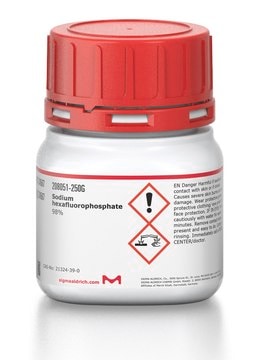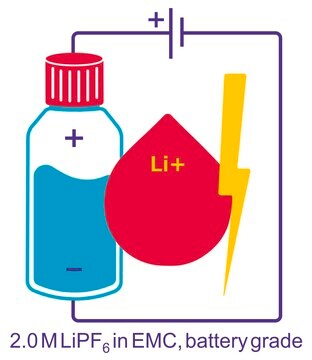201146
Lithium hexafluorophosphate
98%
Synonym(s):
Lithium phosphorus fluoride
About This Item
Recommended Products
Assay
98%
form
powder
mp
200 °C (dec.) (lit.)
solubility
H2O: slightly soluble(lit.)
density
1.5 g/mL (lit.)
SMILES string
[Li+].F[P-](F)(F)(F)(F)F
InChI
1S/F6P.Li/c1-7(2,3,4,5)6;/q-1;+1
InChI key
AXPLOJNSKRXQPA-UHFFFAOYSA-N
Looking for similar products? Visit Product Comparison Guide
General description
Features and Benefits
- It can form suitable SEI membranes in electrodes, especially in the cathode
- It can implement passivation for anode current collectors to prevent their dissolution
- Wide windows of electrical stability
- Excellent solubility and high conductivity in various solvents
- Environment-friendly
Signal Word
Danger
Hazard Statements
Precautionary Statements
Hazard Classifications
Acute Tox. 3 Oral - Eye Dam. 1 - Skin Corr. 1A - STOT RE 1 Inhalation
Target Organs
Bone,Teeth
Storage Class Code
6.1A - Combustible acute toxic Cat. 1 and 2 / very toxic hazardous materials
WGK
WGK 2
Flash Point(F)
Not applicable
Flash Point(C)
Not applicable
Personal Protective Equipment
Certificates of Analysis (COA)
Search for Certificates of Analysis (COA) by entering the products Lot/Batch Number. Lot and Batch Numbers can be found on a product’s label following the words ‘Lot’ or ‘Batch’.
Already Own This Product?
Find documentation for the products that you have recently purchased in the Document Library.
Customers Also Viewed
Our team of scientists has experience in all areas of research including Life Science, Material Science, Chemical Synthesis, Chromatography, Analytical and many others.
Contact Technical Service













